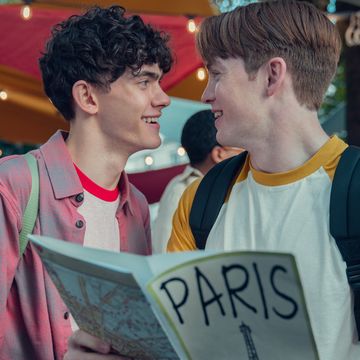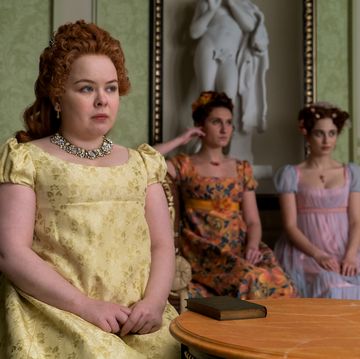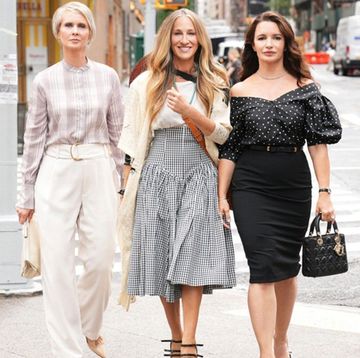My first instinct was to call my mum. I had asked her the evening before not to spend the night at our family home because we don’t have a basement there. But she didn’t want to leave her house. I was frozen. I didn’t know that she was definitely not in the building, but it was 3am in London, 5am in Kyiv and my mum is ageing. She has issues with her blood pressure and I thought maybe she was safe and had just fallen asleep and my call would startle her. But also, I had deep inside me the horrible fear that if I called her and, you know…
So I texted her. ‘Mum, are you alright?’ I saw that my message was not delivered. I called my sister. She didn’t pick up.
I work as a broadcast journalist for BBC News Ukraine, which is part of BBC World Service. I moved to London from Ukraine four years ago, originally to be a producer for BBC News Russian, but after a while I was offered a producer and presenter role on the BBC News Ukraine team. Since the invasion began, I’ve regularly been deployed outside of my usual job parameters to do coverage for our English speaking colleagues. And that morning, the morning that everyone has now seen the footage of, I had been invited by BBC World News presenter Karin Giannone to be what's called a 'presenter’s friend' for the early news bulletins, which air from 6-8am.
We had discussed that there was no way to know how long we would have contact with correspondents in Kyiv. And she thought it would be wise to have somebody in the studio who would be able to read the Ukrainian news wires, to interpret and explain the information as quickly as possible.
When I woke at 3am to get ready to go to the studio, that was when I found out that Kyiv, my native city, had been bombed. It was a shock, because somehow nobody expected the Capital to be targeted like that. Some of my neighbours had shared pictures of the damaged buildings and I started to try and check where these buildings were. I was looking through the images but I still couldn’t make the link in my head that I could be seeing places I knew. But I started verifying the pictures, and then there it was, on the official page of the Ukrainian emergency services. They had published the address. Proof, that a bomb had struck my home.
I was stunned. I didn’t know what to do. I agonised about calling my mum, but the taxi was waiting to take me to the new broadcasting house. I got in the cab and started crying. I cried all the way there. When I arrived at the studio I explained what had happened and that I didn’t know if I had the emotional capacity to go on air but that I would try. And they were very understanding and exerted no undue pressure.
So, we went live. And I felt like I was alright. Then, at some point the director in my earpiece said that they had live footage from Kyiv and could I prepare to introduce it. I didn’t know what the footage would be, as there wasn’t any further information, so I commenced the introduction, describing what I was seeing, where it was and as I am talking, the camera turns to the building where I used to live, and where my mum still lives. And as everyone has now witnessed, it was a very emotional moment for me. The pictures which I had seen before were of the front of the building. My apartment can’t be seen from the front and I’d still had the hope that my home had not been affected. You know, when you don’t see it, you still have that faith inside you that maybe, just maybe… But the video, as we watched live, panned across the back. It showed some flats that looked completely destroyed. And then I saw it. I saw my balcony and the window of the room I was brought up in, which I know now is my mum’s bedroom. The bomb had hit it.
By the time we’d gone on air, I had received a response from my sister confirming that she had managed to persuade my mum not to spend the night there, but I’d heard nothing from mum. It’s only when I was in the BBC studio, at 8:12am that I received the message I had been holding my breath for. ‘We are fine. We are in safety.’ I was so relieved.
Usually, she would begin her messages with: ‘Hi darling.’ She would be very wordy and use smiles and kisses. There was nothing like that. Just, we are fine. I can only imagine what she was going through.
As the programme came to a close and I left the BBC building, I finally had a moment to think about what I was going to do next. I wanted to take the first flight to Kyiv. But then you think, 'Oh my god, there are no flights anymore.' You can’t fly. We take for granted how easy international travel usually is. I had this moment of realising that none of that is possible now. It was like my home was suddenly in another world, and I couldn’t reach it. Everything is cut off and you’re just left to watch people being killed and you can’t reach them, and you can’t stop it and you can’t help them.
And even if I managed somehow to get to Ukraine, what could I provide? Somebody would then have to rescue me too. And I am a single mum of two children, who are also extremely traumatised by everything that is happening to our Ukrainian relatives. But my mum was still there.
My sister and I joined forces to organise my mum’s evacuation. She had managed to get herself and her child out of the Capital and to a place of safety, but our mother didn’t go with her. My sister had driven away during a pause in the attacks, at the risk of being shelled, but mum had refused to get in the car. She didn’t want to become a moving target, and had also said, ‘I am too old to become a refugee.’ She felt that it was absolutely undignified. ‘I am not young,' she explained, 'I won’t be able to adapt. I would prefer to stay in this basement.’
Thankfully, we did eventually manage to get her to agree to leave. From that point, it took a week to get her to the Ukrainian border with Slovakia, which is where I flew to meet her, to bring her the rest of the way. The entire journey to the Slovakian border town, I was rehearsing what I would say to her. I wanted to practice it so that I wouldn’t cry, because she doesn’t like me crying. I felt like I didn’t even have the right to cry, because here I am, safe, while everyone else was going through such horrible things and remaining stoic. So I set about steeling myself.
I am a journalist. I plan everything, so I had a Plan B and a Plan C, because everything was changing every minute. But as I arrived at that town near the border of Slovakia, all my plans were scrapped. My sister and some incredibly kind people in Ukraine had arranged for my mum to be on a certain bus. At some point, we lost connection with my mum. The bus didn’t arrive at the time it was meant to. And we didn’t know where it was, or if she would make it. I didn’t know if I should just go to the border, but there was a queue for several kilometers. And then what? How was I going to try and find her there? So I checked all the information desks and they seemed convinced that the bus was still coming. So I waited. For eight hours.
I could have lost my mind, but I reminded myself that I was safe. My number one task was to stay sane and to keep a strong spirit. I wanted not to be in the position of asking for help, but to be able to provide some help, if anybody needed it. After eight hours had creaked past, I went to have a walk. I wanted to have a break and to speak to some activists that were nearby. And literally the moment I had walked away from the bus station, I got a call from my sister to say mum had arrived. It felt funny, the timing seemed somehow hilarious. I think I laughed out loud as I raced back.
She was standing next to the entrance, wearing her red coat, because she really loves bright colours. She’s very optimistic. As I walked closer I saw that she had become much slimmer. Her face usually lights up when she sees me, she always smiles, but in that moment her whole face was just flat. She was like a shadow of herself. The beautiful red coat was in absolute contrast, a reminder of our life in normality, while her face portrayed a very different reality. She had a little bag with her. Literally tiny. And I didn’t recognise it. And she was in jeans, which I’d never seen her wear before. I remember thinking she looked so strange. But oh my god, this is really my mum. It was my mum. I’d got her. Despite all the rehearsals, I couldn’t say anything. I just hugged her. And she hugged me. And we didn’t speak a word.
I have this horrible feeling of guilt. Of being safe when my home is being destroyed. And this feeling of helplessness, absolute helplessness, when you are just watching your home, your life, everything being ravaged in real time, like some nightmarish blockbuster film, and you can’t do anything from this distance. The people of Ukraine, they have this way about them. You ask, ‘How are you?’ And they always answer, ‘I am fine. We are fine.’ They’re making jokes. It’s horrible to say it but they’ve in some ways gotten used to the horrors of the situation. And to the thought that they could die at any second. For them, it’s the new reality. They’ve had to adapt.
But I see the impact in my mum. Now that she’s here with me. I managed to get her to safety but still every time she sees or hears a plane in the sky, she flinches. She thinks it’s a rocket. She cannot spend much time around groups of people, because her mind thinks that people gathered together are taking shelter and that there will be a bomb attack. And so my feelings of guilt, and helplessness are absolutely real. And it’s horrible. And I don’t know what to do with that.
My consolation is that I have my work. My strength lies in telling the story from here. Getting the best access, spreading balanced information and truth according to the highest BBC standards. And maybe even getting some vital information to those people sitting in basements in Kyiv. That’s what keeps me going.
I sometimes hear from my local friends here that they are so horrified by what they are seeing, that they need to stop watching the news for a bit because it gives them sleepless nights and they feel as though they’re getting secondary trauma. And it is very traumatising of course, but the people in Ukraine can’t have a break. They can’t ask for everything to pause because they are tired and they need to rebuild. No, they are watching in real time as their lives are destroyed. And the only thing that could stop this is if we show it and speak about it and hold people accountable.

Natasha Bird is the Former Executive Editor (Digital) of ELLE.
















